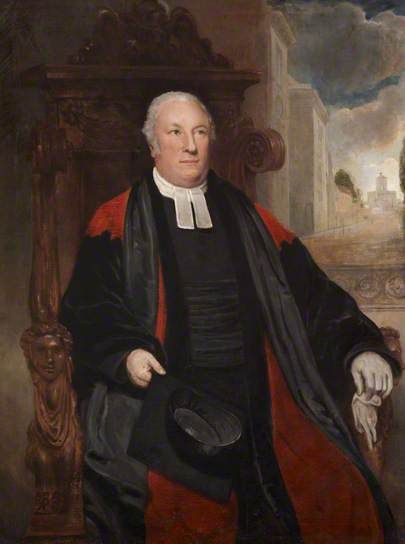Revd. Whittington Landon D.D. (1758-1838)
Possibly the most illustrious clergyman of Bow was Whittington Landon who was Rector between 1833 and 1838. The son of John Landon from Tedstone, Herefordshire, he matriculated at the University of Oxford as a member of Worcester College in 1775, aged 17. He obtained his Bachelor of Arts degree in 1779 and was elected to a college fellowship in 1782, the same year in which he took his Master of Arts. He obtained two further degrees: Bachelor of Divinity in 1790 and Doctor of Divinity in 1795. He was elected Provost of Worcester College in 1795, and held this position until his death. He was appointed Keeper of the Archives of the University in 1796, and held this post until 1815. He also served as Vice-Chancellor of the University of Oxford from 1802 to 1806.
He married Maria Augustina Ready in 1800; they had 3 sons. He died on 29 December 1838

Rev Whittington Landon: Dean of Exeter Cathedral and Rector of Bow
Landon was also an ordained priest in the Church of England. He was rector of the Herefordshire parish of Croft with Yarpole from 1796 until his death. He added the positions of prebendary of Norwich (1811 to 1813) and of Salisbury (1821 until his death), Dean of Exeter (1813 until his death), rector of Bishopstone, Salisbury (1822 to 1826), vicar of Branscombe, Devon (1827 to 1830), Bishop's Tawton (1826-1827) and rector of Bow from 1833 until his death. He probably infrequently visited Bow; he had a resident Curate, Rev William Brock Hellins (1798-1858) who undertook his parish duties.
In 1829 the Western Times asked how he could perform all the roles to which he was appointed. Pluralism, or holding several benefices, was common at that time. Well-connected clergy would reside outside their parish and appoint a curate to do their work. As the Western Times pointed out:
If a parish pays a thousand a year for religion to a man they seldom or ever see, who cares nothing for its spiritual welfare, and who takes no interest in the moral or religion character of the youth, and the lower orders; and they find that these duties are partly performed by a deputy, who receives less than £100 per annum, and who has very little community of feeling with them we ask, will not the laity, of consequence, feel that they would rather pay an active minister £300 or £400 per annum, who would have a community of interest with themselves, and between whom a mutual relation would be felt.
Dean Whittington Landon had three sons all of whom went through Worcester College, Oxford, to become clergymen. Soon after their ordinations, Whittington, as Dean of Exeter Cathedral, had lined up "jobs for the boys".
Vacancies arose at Bishop’s Tawton and Branscombe in 1826 and 1827: his sons not being quite ready he appointed himself as vicar in both parishes.
His eldest son John Whittington Ready Landon (b 1801) was appointed vicar of Braunton in 1826; second son James (b1803) replaced his father as vicar of Bishop’s Tawton in 1827, as did the youngest son George (b1805) as vicar of Branscombe in 1829 until 1837 when George replaced James back at Bishop’s Tawton.
He had already appointed his nephew Thomas Jones Landon (b1778) as Vicar of St Breward in Cornwall in 1815. Thomas was admonished by the Bishop of Exeter for public drunkenness and profane swearing in Bodmin in 1847: this was three years before he died from injuries after falling off his horse.
Of Whittington Landon’s sons – John remained Vicar at Braunton until his death in 1880. James went off the rails, allegedly marrying a prostitute (Anna Maria Snell) in 1833. Before his second marriage in 1853 to Frances Harbour he was jailed for vagrancy and begging. He died in 1878 in New Malden, Surrey. George only lasted a couple of months in Bishop’s Tawton before becoming Vicar of Richard’s Castle in Shropshire where he remained until his death in 1873. He too ran into trouble and was in jail as a debtor between 1858 and 1861, at which time he had a wife, nine grown up children and debts of £6000.
Whittington Landon’s niece Letitia Elizabeth Landon was a famous poet who wrote under her initials L.E.L. In 1838, aged 36, four months after her marriage to George Maclean, she died suddenly in what is now Ghana, where her husband was Governor. She was apparently found on the floor of her bedroom clutching an empty medicine bottle labelled "Acid. Hydrocyanicum delatum. Pharm. : Lond., 1836 : medium dose, 5 minims."
by Peter Selley
